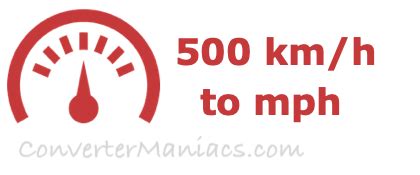Converting speed units from kilometers per hour (km/h) to miles per hour (mph) is a common requirement in various contexts, including automotive, aviation, and meteorology. To convert 500 km/h to mph, we need to apply the conversion factor between these two units. Knowing that 1 kilometer is approximately 0.621371 miles, we can calculate the equivalent speed in miles per hour.
Conversion Factor and Calculation

The conversion factor from kilometers to miles is 1 km = 0.621371 miles. To find the speed in mph, we multiply the speed in km/h by this conversion factor. For 500 km/h, the calculation would be: 500 km/h * 0.621371 miles/km = 310.6855 mph. Therefore, 500 km/h is equivalent to approximately 310.69 mph when rounded to two decimal places.
Practical Applications and Considerations
This conversion is not only relevant for understanding speed limits or vehicle performance in different countries but also for comparing speeds across various modes of transportation or weather phenomena. For instance, a car traveling at 500 km/h would be moving at an extremely high speed, equivalent to about 310.69 mph, which is beyond the capabilities of most production vehicles and even many high-performance cars. Such speeds are more commonly associated with aerospace applications or certain experimental vehicles.
| Speed in km/h | Equivalent Speed in mph |
|---|---|
| 500 km/h | 310.6855 mph |

Key Points
- The conversion from km/h to mph involves multiplying the speed in km/h by 0.621371 miles/km.
- 500 km/h is equivalent to approximately 310.69 mph.
- This conversion is relevant for understanding and comparing speeds across different contexts and countries.
- Speeds of 500 km/h are exceptionally high and typically beyond the capabilities of standard vehicles.
- Understanding speed conversions is crucial for applications in transportation, weather, and other fields where precise speed measurements are necessary.
Technical Accuracy and Accessibility

Ensuring technical accuracy in speed conversions is paramount, as small discrepancies can lead to significant differences in real-world applications. However, it’s also important to present this information in an accessible manner, avoiding overly complex calculations or jargon that might confuse readers without a technical background. By providing clear, step-by-step explanations and using everyday examples, individuals can better understand and apply speed conversions in their daily lives or professional endeavors.
Evidence-Based Analysis
Evidence-based analysis in the context of speed conversions involves relying on established conversion factors and applying them consistently. This approach helps in minimizing errors and ensuring that comparisons between different speeds are fair and accurate. For instance, when analyzing the performance of vehicles or the impact of weather phenomena, using precise speed conversions can significantly affect the conclusions drawn and the decisions made based on those analyses.
What is the primary conversion factor used to convert km/h to mph?
+The primary conversion factor is that 1 kilometer is approximately equal to 0.621371 miles.
How do you convert 500 km/h to mph?
+To convert 500 km/h to mph, you multiply 500 by the conversion factor 0.621371 miles/km, resulting in approximately 310.6855 mph.
What are some practical applications of converting km/h to mph?
+Practical applications include understanding speed limits, comparing vehicle performances, and analyzing weather phenomena across different countries and contexts.
